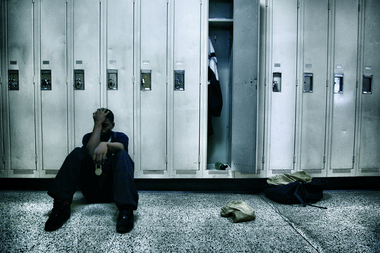Back to school and gay

By Jason Dilts
Gayly Homo on the Range Columnist
It isn’t words that matter so much; it’s the meaning behind them. Intentions add definition, giving profound significance to expressions.
“That’s so gay.” “Dude, you’re a fag.” “Queer!” “Faggot!” “Fudge-packer.” “Dyke.”
Those are among the more common phrases verbally bandied about in the halls of schools across America. They may seem like simple words, but the context behind them is what cuts deep. Each time we hear them, we feel a little less human.
Recent headlines show just how deep they cut. There’s a study that was just released by the Centers for Disease Control and Prevention that finds gay, lesbian, and bisexual U.S. high school students are more likely than heterosexual students to engage in self-destructive behaviors such as disordered eating, smoking, drug use, and excessive alcohol consumption. Some might point to this as evidence of a moral decay inherent with homosexuality, but doing so dismisses a larger truth.
A different study done on the same population revealed that LGBT youth were nearly two times as likely than their straight peers to be bullied in school as well as be sexually and physical harassed. They also make up about 1/3 of all teen suicide cases. When darts of venom are thrown our way, we tend to internalize their poison. Negativity gets projected onto us from the corner of someone else’s insecurity. As a result, we emulate behaviors that bring us down farther than any attack someone else could launch.
When I was a sophomore, going to high school felt more like entering a battle field than it did an institution of learning. More people referred to me as “faggot” than they did “Jason.” Navigating the hallways in between classes was a treacherous journey full of spit wads, back slaps, and violent threats. The bathroom was a dangerous place; I was assaulted there early in the school year and learned to just hold it in. The gym was even worse. To me, P.E. stood for “physical endangerment.” There was a boy in my class who had an odd fascination with my sexuality. His name was Anthony. He made a mockery of my identity in the locker room with lewdly bombastic sexual gestures that made many of the other guys roll with laughter. The day he sexually assaulted me was no laughing matter, though. That was the day I began to internalize the poison; it got deep into my bloodstream.
My mind had been trained to view each day as a battle when I was an adolescent. I suppose it’s natural that I went to war with myself as an adult. After that incident, I became shackled by shame. Negative self-talk permeated my idle thoughts. My body became an inconvenient orifice I was forced to live in. Life became a chore I had to get through. I entered politics as a way of fighting back. Every electoral victory I could achieve on behalf of gay rights was a punch in the stomach to Anthony.
There comes a point, though, where you can either twist someone else’s knife deeper inside yourself, or choose to pull it out for your own relief. When you stare down negativity, it runs away.
My ordeal happened in 1999. Much of the bullying I was subjected to was viewed as a normal rite of passage. Yes, it HAS gotten better. Today, you can download You Tube vides of the President of the United States and just about every celebrity telling you to hang in there. It might seem trite, but those videos are lifelines to more people that you realize.
Some of us are still in the trials of navigating hostile terrain at school. Many of us have long graduated. The wounds cut deep regardless. We cannot underestimate the power of words. We can only redefine their meaning by living a life of authenticity and integrity. The more of us who are out, the less we’re likely to heard these harsh verbal insults. It becomes increasingly hard to marginalize people when they aren’t on the fringes anymore!
I’m sure that many of you have your own war stories to tell. We all have our own shame to contend with. I hope that you allow your own negative energy to be released. You deserve to live a life of deep meaning, not deep pain.





